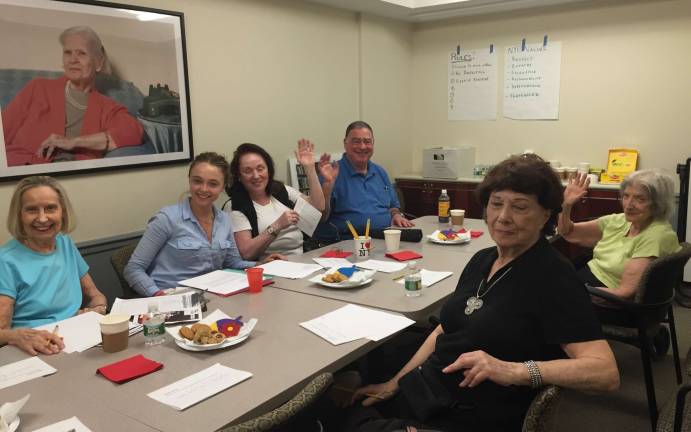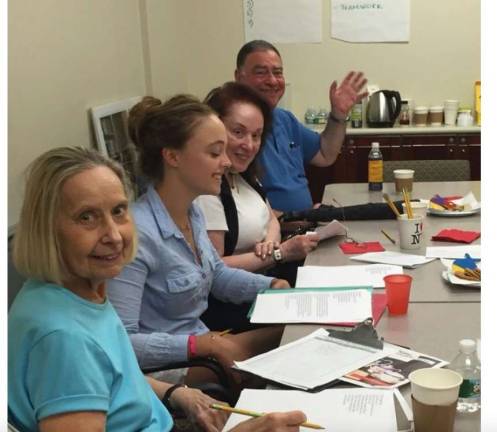Tea and poetry


It’s not every 17-year-old who can say they’ve had their photographs displayed around the world — including two at the Met Museum. Alison Hirsch, a junior at the Trinity School, is one of them. Her latest accomplishment, however, is becoming the youngest person to be approved by the Cornell Institutional Review Board of Research Integrity (IRB) to study the effects of poetry on mood during the Tea and Poetry sessions she runs once a month at the Upper East Side’s Irving Sherwood Wright Center on Aging.
One Tuesday each month, Hirsch and a group of seniors at the Irving Wright Center on First Avenue between 77th and 78th Streets gather around a long table with cookies and tea to read and discuss poetry. Hirsch says she’s always felt comfortable around older people and two years ago decided she wanted to reach out to them.
“I realized there’s a lot of stigma on aging and it’s very isolating in society,” she said. “I knew that that’s the group I wanted to reach. Then in ninth grade, I was able to get in contact with Irving Wright Center and set up a meeting and brainstorm.”
Hirsch, a natural storyteller who also works for her school’s newspaper and literary magazine, eventually decided to share her love of poetry.
“I loved stories ever since I was younger and then when I found poems I was like, this is so great because it’s a small story,” she said.
For each session, Hirsch selects four to five poems for her class, which has as many as 17 attendees. She gives a short background on the poet and then reads the poem aloud to the class. Everyone will discuss their interpretations. According to Hirsch, there is no shortage of voices.
“They’ve learned so much, their comments are amazing, they’re insightful and they’re engaged with the text like it’s alive,” Hirsch said. “I feel so lucky because it’s so great to read poetry with people that sometimes know the poet, remember the decade the poem was written in, can explain it, give context to it — context I could only imagine from what I’ve gotten in the poem — and hear about people’s different experiences.”
Hirsch said that Robert Hayden’s poem, “Those Winter Sundays” (1966) registered very well with the class and prompted many to share personal stories. “Trees” by Joyce Kilmer (1914) was another class favorite; Hirsch said many participants had studied the poem in grade school and enjoyed revisiting the text. The class has also read some of Hirsch’s own poems, including “Swinging,” and “An Ode to Curiosity, Cowardice, and Cinema.”
Some attendees have even been inspired to write their own poetry to bring to the sessions and share with the group.
“I’m so happy about that,” Hirsch said.
Hirsch wanted feedback about the sessions, hoping to improve her teaching skills, so she began handing out mood forms before and after class. The participants would rate their mood on a scale of one to ten and leave feedback comments. Hirsch began to find that moods would improve from the beginning of class, particularly for those who were the most engaged during the discussions.
“I realized it’s selfish to just use these to see how to better my own personal class,” Hirsch said. “It’s interesting to see how much it affects people’s moods, so I brought it to the attention of the IRB and it got approved and now I can actually publish this work.”
Hirsch and the IRB created a new, more in-depth rating system for moods that she will soon begin to implement. The new scale lists individual moods such as happiness, fatigue, and insecurity that attendees rate on a scale of zero to five.
“We can tell you, oh, before people were insecure and now they’re more confident, or before they were tired and now they’re excited,” she said.
For Hirsch, one of the most exciting aspects of the class is that she has been able to offer a consistent social opportunity for her guests that has now turned into a close community of poetry enthusiasts.
“There’s a whole social aspect that came along with people seeing it as, you know, this is why I got out of the house today,” Hirsch said. “They’re friends now that come together who didn’t know each other before. It’s hard to make friends when you’re that age. You don’t have school, you don’t have a job, there’s not really places to meet people, so it’s nice that they’re friends. They exchange emails and stuff so that’s really exciting. They’ll have inside jokes. It’s really great.”
While she will be graduating from high school next year, Hirsch says she hopes to continue doing Tea and Poetry for as long as possible.